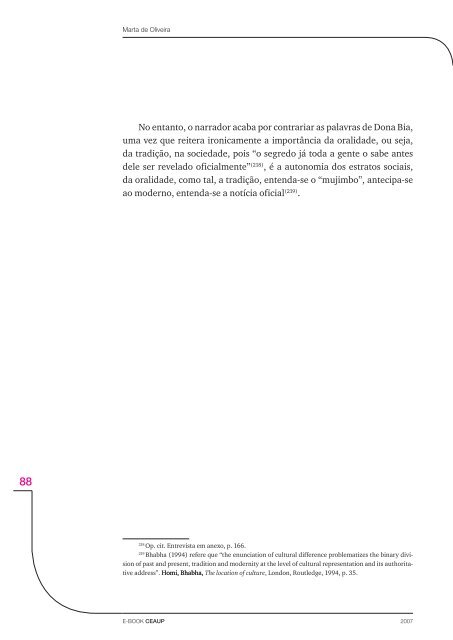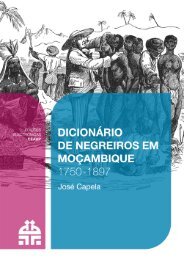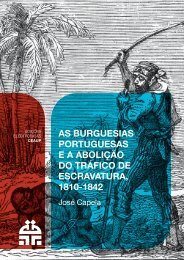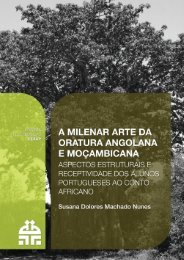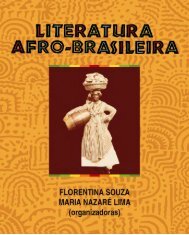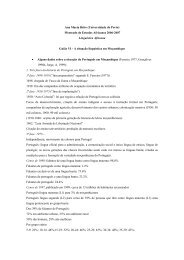Marta <strong>de</strong> OliveiraNo entanto, o na<strong>rra</strong>dor acaba por contrariar as palavras <strong>de</strong> Dona Bia,uma vez que reitera ironicamente a importância <strong>da</strong> orali<strong>da</strong><strong>de</strong>, ou seja,<strong>da</strong> tradição, na socie<strong>da</strong><strong>de</strong>, pois “o segredo já to<strong>da</strong> a gente o sabe antes<strong>de</strong>le ser revelado oficialmente” (218) , é a autonomia dos estratos sociais,<strong>da</strong> orali<strong>da</strong><strong>de</strong>, como tal, a tradição, enten<strong>da</strong>-se o “mujimbo”, antecipa-seao mo<strong>de</strong>rno, enten<strong>da</strong>-se a notícia oficial (219) .88218Op. cit. Entrevista em anexo, p. 166.219Bhabha (1994) refere que “the enunciation of cultural difference problematizes the binary divisionof past and present, tradition and mo<strong>de</strong>rnity at the level of cultural representation and its authoritativeaddress”. Homi, Bhabha, The location of culture, London, Routledge, 1994, p. 35.E-book CEAUP 2007
<strong>Na</strong>(<strong>rra</strong>)ção satírica e humorística: uma <strong>leitura</strong> <strong>da</strong> <strong>obra</strong> na<strong>rra</strong>tiva <strong>de</strong> Manuel Rui“Ca<strong>da</strong> livro é uma busca <strong>da</strong> minhai<strong>de</strong>ntificação com o País e comigo próprio”.José Cardoso Pires“Exercer a crítica <strong>da</strong> nação é uma forma <strong>de</strong>optimismo; só o silêncio é pessimista; e acrítica como a cari<strong>da</strong><strong>de</strong>, começa por casa”.Wole Soyinka1 MORTO & OS VIVOS(“De Um Comba”)Constituído por três contos, o livro adopta uma nova versão do realismo,contrariamente ao processo patente nas <strong>obra</strong>s anteriormente estu<strong>da</strong><strong>da</strong>s.Referimo-nos ao conto mais significativo do livro, e que lhe dáo nome, “De um comba”, aí o fantástico e o mágico servem como pontos<strong>de</strong> parti<strong>da</strong> para uma análise <strong>da</strong> socie<strong>da</strong><strong>de</strong> luan<strong>de</strong>nse.Antes, porém, <strong>de</strong> nos retermos sobre os diversos aspectos aí <strong>de</strong>senvolvidos,convém aten<strong>de</strong>r aos dois contos anteriores, também eles repletos<strong>de</strong> humor e ironia.Em “O Rei dos papagaios”, Kalakata, o miúdo, apesar <strong>da</strong>s inúmerasdificul<strong>da</strong><strong>de</strong>s, vê-se reconhecido e valorizado pela sua habili<strong>da</strong><strong>de</strong> emfazer papagaios (220) .<strong>Na</strong> na<strong>rra</strong>tiva, <strong>de</strong>paramo-nos, à semelhança <strong>de</strong> outras <strong>obra</strong>s, com asfrequentes “bichas do pão”, on<strong>de</strong> tudo vale para conseguir um simples89220Também “Mestre Zé” <strong>de</strong> Saxofone e Metáfora (2001), em “Eu também posso cantar”, era habilidoso,na sua arte <strong>de</strong> fazer carros <strong>de</strong> marca em miniatura.2007 E-BOOK CEAUP
- Page 3:
Na(rra)ção satíricae humorístic
- Page 7 and 8:
ÍNDICEIntrodução 1701. ParteOs
- Page 9:
“Leituras! Leituras!Como quem diz
- Page 13 and 14:
Na(rra)ção satírica e humorísti
- Page 15:
Na(rra)ção satírica e humorísti
- Page 18 and 19:
Marta de Oliveira18contextualizaç
- Page 20 and 21:
Marta de Oliveira“Burguesismos”
- Page 23:
Na(rra)ção satírica e humorísti
- Page 26 and 27:
Marta de Oliveiraproporcionada aqua
- Page 28 and 29:
Marta de Oliveira28UNITA) e o zaire
- Page 30 and 31:
Marta de Oliveira30Os problemas dei
- Page 32 and 33:
Marta de Oliveirasemelhantes às qu
- Page 34 and 35:
Marta de OliveiraFICÇÃO NARRATIVA
- Page 36 and 37:
Marta de OliveiraNegritude em Fran
- Page 38 and 39: Marta de Oliveirabundo (49) , perso
- Page 40 and 41: Marta de Oliveiralista (60) , por o
- Page 42 and 43: Marta de Oliveira42o riso, já que
- Page 44 and 45: Marta de Oliveiraou a sorrirmos com
- Page 46 and 47: Marta de OliveiraAlvim (90) , perso
- Page 48 and 49: Marta de OliveiraDa Palma da Mão (
- Page 50 and 51: Marta de Oliveiradores e suas falas
- Page 52 and 53: Marta de OliveiraA ESCOLA DO REAL
- Page 54 and 55: Marta de Oliveira- Quem me dera ser
- Page 56 and 57: Marta de OliveiraSe o disse, melhor
- Page 58 and 59: Marta de Oliveira58lores veiculados
- Page 60 and 61: Marta de Oliveira60O crítico socia
- Page 63: Na(rra)ção satírica e humorísti
- Page 66 and 67: Marta de Oliveira66procura equacion
- Page 68 and 69: Marta de Oliveirada. Verificamos, d
- Page 70 and 71: Marta de Oliveira70ou burguesismo,
- Page 72 and 73: Marta de Oliveira“Merdas de peque
- Page 74 and 75: Marta de Oliveirasiderando a profes
- Page 77 and 78: Na(rra)ção satírica e humorísti
- Page 79 and 80: Na(rra)ção satírica e humorísti
- Page 81 and 82: Na(rra)ção satírica e humorísti
- Page 83 and 84: Na(rra)ção satírica e humorísti
- Page 85 and 86: Na(rra)ção satírica e humorísti
- Page 87: Na(rra)ção satírica e humorísti
- Page 91 and 92: Na(rra)ção satírica e humorísti
- Page 93 and 94: Na(rra)ção satírica e humorísti
- Page 95 and 96: Na(rra)ção satírica e humorísti
- Page 97 and 98: Na(rra)ção satírica e humorísti
- Page 99 and 100: Na(rra)ção satírica e humorísti
- Page 101 and 102: Na(rra)ção satírica e humorísti
- Page 103 and 104: Na(rra)ção satírica e humorísti
- Page 105 and 106: Na(rra)ção satírica e humorísti
- Page 107 and 108: Na(rra)ção satírica e humorísti
- Page 109 and 110: Na(rra)ção satírica e humorísti
- Page 111 and 112: Na(rra)ção satírica e humorísti
- Page 113 and 114: Na(rra)ção satírica e humorísti
- Page 115 and 116: Na(rra)ção satírica e humorísti
- Page 117 and 118: Na(rra)ção satírica e humorísti
- Page 119 and 120: Na(rra)ção satírica e humorísti
- Page 121 and 122: Na(rra)ção satírica e humorísti
- Page 123 and 124: Na(rra)ção satírica e humorísti
- Page 125 and 126: Na(rra)ção satírica e humorísti
- Page 127 and 128: Na(rra)ção satírica e humorísti
- Page 129 and 130: Na(rra)ção satírica e humorísti
- Page 131 and 132: Na(rra)ção satírica e humorísti
- Page 133: Na(rra)ção satírica e humorísti
- Page 136 and 137: Marta de Oliveira136É iniludível,
- Page 138 and 139:
Marta de OliveiraA sigla, que de ce
- Page 140 and 141:
Marta de Oliveirasão literária do
- Page 142 and 143:
Marta de OliveiraDA PÁGINA AO PALC
- Page 144 and 145:
Marta de Oliveira144e como tal “a
- Page 146 and 147:
Marta de OliveiraCom efeito, como b
- Page 148 and 149:
Marta de Oliveirapressa, mas sem co
- Page 150 and 151:
Marta de OliveiraCONCLUSÃO“Where
- Page 152 and 153:
Marta de Oliveira152contínuo e con
- Page 154 and 155:
Marta de OliveiraHomem do seu tempo
- Page 156 and 157:
Marta de OliveiraII. Bibliografia p
- Page 158 and 159:
Marta de OliveiraFERNANDES, J. A. S
- Page 160 and 161:
Marta de OliveiraMATA, Inocência,
- Page 162 and 163:
Marta de Oliveiraportuguesa nos tr
- Page 164 and 165:
Marta de OliveiraENTREVISTA A MANUE
- Page 166 and 167:
Marta de OliveiraPor vezes, quando
- Page 168 and 169:
Marta de Oliveiraa viúva. Ele pode


